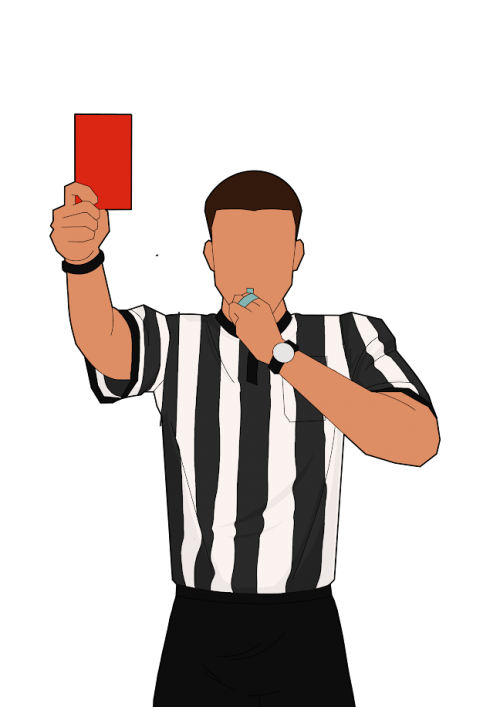Featured Image: Hailey Benders | Marlin Chronicle
Attendees go to sports events for the action, and there’s no better action than watching a red card go up in the air.
Josh Condit, junior and defender for the Men’s Soccer team, received a red card on Oct. 14 in a game against the University of Lynchburg. During a play, he elbowed a player, which led to a stare-down, lasting about ten seconds. In the heat of the moment, Condit slapped the opposing player.
“I guess I gave him a little love tap on the face,” Condit said.
After this, the player hit Condit back harder, and ran away. A video of the moment shows Condit snapping back from the hit. Condit then ran after him on the field.
The referee administered a red card to the Lynchburg player, and then to Condit.
“I think it was fair, but it also wasn’t. I think the other guy deserved it more, but I guess I started it,” Condit said.
The punishment for this card made it so Condit had to sit out the rest of the ongoing game and the following game.
Emma Acanfora is a junior forward for the Women’s Soccer team. In a game against Randolph-Macon College on Oct. 4, she received a yellow card.
This card was administered because Acanfora raised her voice at the referee after a call she did not agree with. The referee had called a foul on VWU, while Acanfora felt that it should have been on Randolph-Macon.
In regard to the actual card, she felt it was justified since she did yell.
“Was the card fair? Yes. The call before it? No,” Acanfora said.
While there was no consequence for this single yellow card in soccer, if a student receives five in a single season, they have to sit out for a match.
Junior Lauren Hedspeth is a member of the Field Hockey team. In a game against Washington & Lee on Oct. 14, Hedspeth received a green card. In Field Hockey, a green card means the player is suspended from playing for two minutes. With one minute left in the game, the ball hit her foot as she was carrying it.
From the young age of seven years old, her training in field hockey taught her to continue to play out the game until the whistle blew, and was in the motion of hitting the ball when the referee blew the whistle for the foul. In field hockey, the ball may not touch a player’s foot, only the stick. The referee carded Hedspeth continuing the play despite it hitting her foot, requiring her to sit the game out for two minutes. This meant that she was out for the end of the game, and during one minute of overtime.
“I think the referee did not take into account that it was raining and windy, and there was one minute left in a tight game. There was obviously a lot of adrenaline and I just didn’t process the whistle,” Hedspeth said.
She believes the call to be a misunderstanding, and an unfortunate one at that. When carded, field hockey players cannot swap out, and must continue a man down.
Shannon Gaffney is a junior on the Field Hockey team as well. She is one of the four captains, and in her match on Oct. 7 against Eastern Mennonite University, while she was acting as the speaking captain, she was carded.
Another experienced player, Gaffney started playing the sport at nine years old, so this card was a shock to her.
While in a corner set play, the team performed an illegal substitution. While Gaffney knew this was illegal, she did not know that the card goes on the captain.
She was administered a green card, and had to sit out the game for two minutes.
The initial feelings were ones of confusion, because she did not understand how she was involved in the play, but the referee stated that the blame goes on the speaking captain.
Despite confusion, Gaffney composed herself well after clarification.
She said, “When I receive a card, I always say; calm down, and be smarter.”
While players can become annoyed with referees during matches when they are carded, VWU student athletes understand the importance of this crucial game element and offer advice for those who do receive cards.
“Keep respectful no matter how frustrating it is,” Hedspeth said.
Acanfora and Condit both spoke on how referees are set in their ways, and it is often best not to argue with them.
“They are probably not going to change their minds, so once the call has already happened, it’s a done deal,” Acanfora said.
And speaking from his experience with receiving a red card, Condit said, “Just walk off the field. The referee is not going to change his mind.”
The main takeaway from these athletes, however, is to be respectful.
“If you can argue it, do it respectfully so that the referee will be more willing to take your side of things,” Hedspeth said.
By: Kara Hopkins



